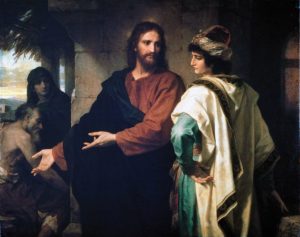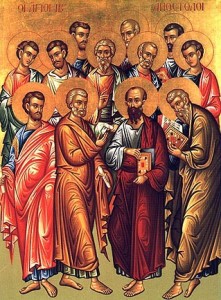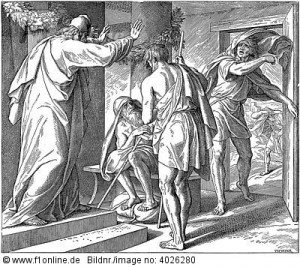Thoughts on Sunday’s Lessons for Oct. 13, 2024 (Pentecost 21B/Proper 23)

Christ and the Rich Young Ruler (1889), oil painting on canvas by Heinrich Hofmann (1824-1911). Riverside Church, New York. Ironically, this painting was purchased for Riverside Church by John D Rockefeller Jr., one of the richest men in the world. (Click image to enlarge.)
First Reading (Track One): Job 23:1-9, 16-17
Tormented beyond imagination, Job has lost everything. All his possessions and much of his family are gone. His friends, seeking to console him, have done a very poor job of showing compassion. He must have done something wrong, they scolded him in the verses just before this reading. Did his lack of piety or his great wickedness anger God. Now Job responds with bitter, angry words: He deserves a chance to lay out the facts. He has a right to argue his case before God. If only God will hear him, he is sure that he will prevail. He looks in every direction, he can’t find God anywhere. Terrified, he wants to vanish into darkness. Next week, we hear God’s reply.
First Reading (Track Two): Amos 5:6-7, 10-15
We are called to subject ourselves to God, to behave justly, and to give generously to the poor, never stealing from or harming those who are less favored than we are. Listen for this theme through Sunday’s Lectionary readings. In our Track Two first reading the Prophet Amos warns Israel’s Northern Kingdom that its practice of living well while trampling the poor will lead to disaster at the hands of the Assyrians. “Seek good and not evil,” urges the prophet. Indeed, just a few verses after this passage, Amos will utter this familiar call to the people of God: “Let justice roll down like waters, and righteousness like an ever-flowing stream.”
Psalm (Track One): Psalm 22:1-15
When Jesus was dying on the cross, in his final agony he cried out the words that begin Psalm 22: “My God, my God, why have you forsaken me?” The Psalmist’s pain revealed in these verses seem to echo Job’s lament. This is the cry of one who has suffered as Job has suffered, mocked by those around him and sunk in the depth of despair. He thinks that he has no place to turn. And yet God remains, the creator who knew him as an infant and who, he prays, will remember him now.
Psalm (Track Two): Psalm 90:12-17
We jump in to the middle of this Psalm in Sunday’s readings, skipping past the first portion in which the writer – held by unlikely tradition to be Moses himself – has warned of God’s anger with a sinful people. In these verses we plead with God to return, to show loving-kindness, to teach the people to be wise, and to replace our adversity with gladness. Through God’s works, grace and splendor, we pray, may the people be wise, turn the work of our hands to God’s purposes, and enjoy prosperity as the result of our handiwork.
Second Reading: Hebrews 4:12-16
Perhaps this passage from the letter to the Hebrews unintentionally reveals its roots in Roman persecution of the early church that had led some Christians to abandon their faith out of fear. It speaks of Jesus in terms that we seldom associate with the Good Shepherd: “sharper than any two-edged sword, piercing until it divides soul from spirit, joints from marrow … before him no creature is hidden, but all are naked and laid bare …” And yet, though we are called to account before God, we know that Jesus, as fully human, knows and understands us: Through Jesus, the living and active word of God and our great high priest we receive God’s mercy and grace.
Gospel: Mark 10:17-31
“Go, sell what you own, and give the money to the poor … then come, follow me.” Really? Stewardship season is coming soon, when we will be invited to pledge our support of the church. Luckily for us, however, we’re not expected to give everything we own – are we? Perhaps these verses, like the Sermon on the Mount, challenge us by setting Jesus as a standard of perfection that we can aim for but won’t likely reach. Or perhaps we are meant to squirm, remembering just how rich we are, and ask ourselves if our possessions in any way stand between us and real love of God and neighbor.



 First Reading:
First Reading: